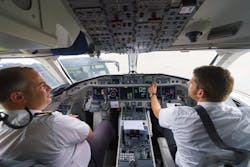AI copilot enhances human precision for safer aviation
CAMBRIDGE, Mass., - Imagine you're in an airplane with two pilots, one human and one computer. Both have their “hands” on the controllers, but they're always looking out for different things. If they're both paying attention to the same thing, the human gets to steer. But if the human gets distracted or misses something, the computer quickly takes over, Rachel Gordon writes for MIT News. Continue reading original article.
The Military & Aerospace Electronics take:
5 October 2023 - MIT researchers have developed the Air-Guardian system at the institution's Computer Science and Artificial Intelligence Laboratory (CSAIL). The autopilot is proactive, and tracks pilot's eyes and maps where people are directing their attention.
Gordon writes that similar cooperative control systems could be used in cars, drones, and robotics.
"An exciting feature of our method is its differentiability," says MIT CSAIL postdoc Lianhao Yin, a lead author on a new paper about Air-Guardian. "Our cooperative layer and the entire end-to-end process can be trained. We specifically chose the causal continuous-depth neural network model because of its dynamic features in mapping attention. Another unique aspect is adaptability. The Air-Guardian system isn't rigid; it can be adjusted based on the situation's demands, ensuring a balanced partnership between human and machine."
"This system represents the innovative approach of human-centric AI-enabled aviation," adds Ramin Hasani, MIT CSAIL research affiliate and inventor of liquid neural networks. "Our use of liquid neural networks provides a dynamic, adaptive approach, ensuring that the AI doesn't merely replace human judgment but complements it, leading to enhanced safety and collaboration in the skies."
Jamie Whitney, Senior Editor
Military + Aerospace Electronics
